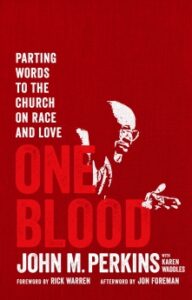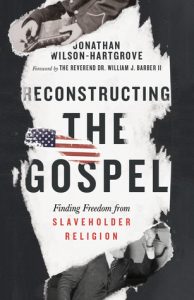 Summary: At 87 years old, the message John Perkins will be focusing on the rest of his life is the importance of racial reconciliation within the church.
Summary: At 87 years old, the message John Perkins will be focusing on the rest of his life is the importance of racial reconciliation within the church.
One Blood is John Perkins’ last book. So I read it conscious of several of several others books that I have read that were consciously the last books written. John Stott’s last book was about discipleship. Johnny Cash’s last album was about death and regret. This book is about racial issues within the church.
I wish that everyone was familiar with John Perkins. (If you are familiar with him you can skip to the second half where I actually get to the book.) He grew up the son of a sharecropper. His mother died when he was two years old of Pellagra, which is a disease that is most often caused by such a poor diet that the person is essentially starving to death. When he was 16 his older brother, after returning from serving in the military during World War II was killed by a local police officer. Perkins was sent to California because his family feared that he would be killed as well.
When John Perkins was 27, his son Spencer invited him to church and he first became a Christian. Three years later (in 1960) he and his family moved back to Mendenhall, Mississippi to start Voice of Calvary. That ministry expanded to include an early Head Start program, social services and bible training program. In 1965, John Perkins started registering African Americans to vote and helped form a food cooperative to care for people that were blocked out of their jobs as a result of registering to vote. In 1967, his children were the first to desegregate the local high school. In 1969, he lead an economic boycott of White owned businesses, which directly lead to his false arrest and torture at the hands of local police officers. That torture required the removal of part of his stomach and life long health problems.
Later John Perkins and his wife Vera Mae started similar ministries in Jackson, Mississippi and then in Pasadena California. In 1989, he co-founded the Christian Community Development Association which gathered together similar organizations around the country that were mostly evangelical leaning theologically and agreed on the basic principles of the 3 Rs (relocation, reconciliation, and redistribution). Most recently the John and Vera Mae Perkins Foundation was created as a training center for Christian community development and leadership.
Although Perkins only formally completed third grade, One Blood is his 11th book that he wrote or co-wrote. I recommend his Let Justice Roll Down, a 2006 memoir as the best place to start with his books.
John Perkins is an elder statesman of both Christian Community Development and the Civil Rights era. We should listen to what he has to say because he has earned the right to say it through his life’s work. This is not an abstract theorizing about racial issues. We do not have many civil rights icons left.








